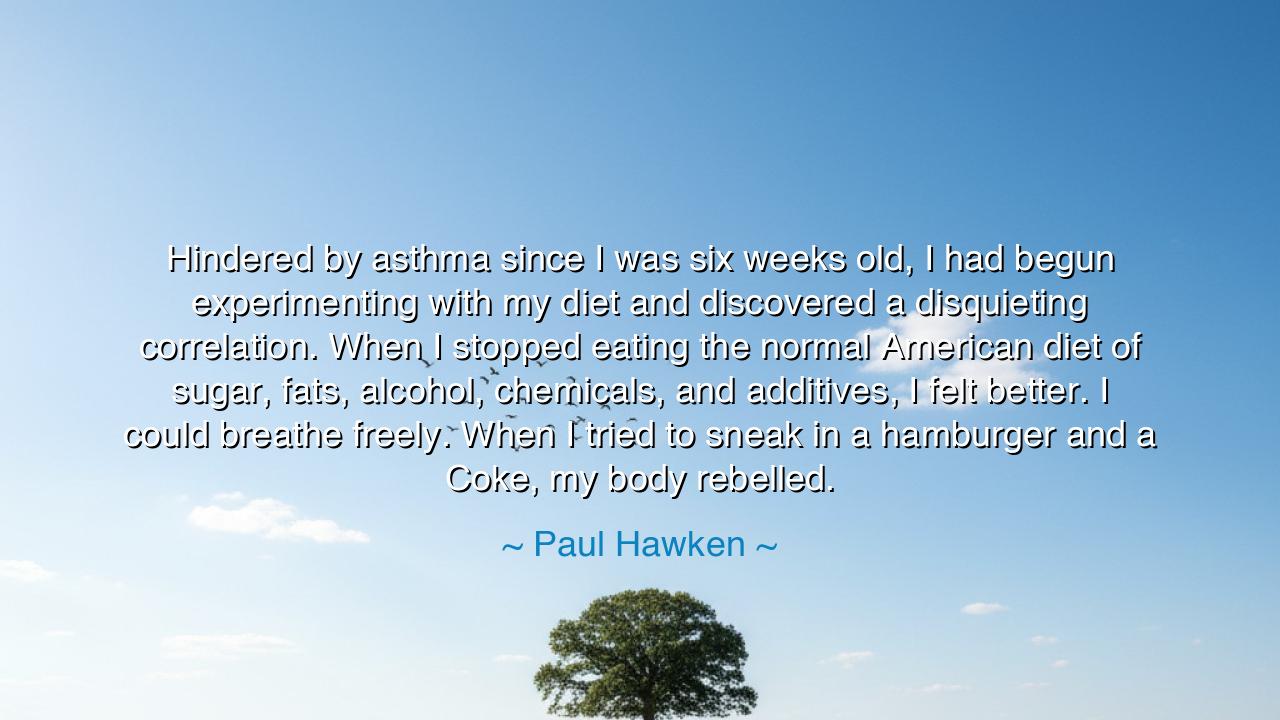
Hindered by asthma since I was six weeks old, I had begun
Hindered by asthma since I was six weeks old, I had begun experimenting with my diet and discovered a disquieting correlation. When I stopped eating the normal American diet of sugar, fats, alcohol, chemicals, and additives, I felt better. I could breathe freely. When I tried to sneak in a hamburger and a Coke, my body rebelled.






"Hindered by asthma since I was six weeks old, I had begun experimenting with my diet and discovered a disquieting correlation. When I stopped eating the normal American diet of sugar, fats, alcohol, chemicals, and additives, I felt better. I could breathe freely. When I tried to sneak in a hamburger and a Coke, my body rebelled." These words, spoken by Paul Hawken, are a testament to the profound connection between what we consume and the health of our bodies. Hawken's experience teaches us a powerful lesson: that the food we eat is not just fuel for the body, but a source of life or, conversely, a potential source of struggle and suffering. In a world where the mindless consumption of processed foods has become the norm, Hawken’s revelation calls us to awaken to the impact of what we put into our bodies—and how it affects not just our physical health, but our spiritual well-being.
In the ancient world, the great healers and thinkers understood that food was not simply something to fill the stomach, but a potent force that shaped the body, the mind, and the soul. Hippocrates, the father of medicine, famously said, "Let food be thy medicine, and let medicine be thy food." He understood that what we consume has a direct effect on the state of our health and vitality. Just as the Greeks believed in a balanced diet to maintain harmony within the body, so too does Hawken’s experience reflect an ancient truth: that health and well-being are deeply rooted in the quality of what we eat. To live without care for what nourishes us is to invite imbalance into our lives.
Hawken’s story also reminds us of the wisdom of the Stoics, who believed in self-discipline and control as the key to mastering the self. The Stoics, such as Epictetus and Marcus Aurelius, were keenly aware of the influence that external factors—such as diet and pleasure—had on their internal state. They taught that a person must cultivate a strong, resilient mind, one that was not led astray by the excesses of the body. Hawken’s experience mirrors this philosophy. By rejecting the normal American diet, filled with sugar, fats, and additives, Hawken is practicing the art of self-mastery, choosing to live with greater awareness of how the food he consumes affects his body and mind. His realization is a call to take responsibility for what we ingest, recognizing that the mind and body are interconnected, and must be cared for with awareness and respect.
Consider the example of the ancient Romans, who, despite their love for feasts, also placed great importance on moderation. Cicero, the Roman philosopher, often spoke of the need for balance in all aspects of life. He understood that indulgence, though pleasurable, could lead to disorder and weakness in both the body and the mind. Just as Hawken found relief from his asthma when he abstained from unhealthy foods, the Romans practiced a form of dietary wisdom, where they consumed with an awareness of their bodies’ needs. They knew that too much of anything—be it food, drink, or pleasure—would unbalance the body, leaving it vulnerable to disease and decay.
The deeper lesson of Hawken’s words is not merely about the foods we should avoid but about the greater importance of awareness and intentionality in all aspects of our lives. His story serves as a powerful reminder that when we engage in habitual, mindless consumption, we disconnect from the natural rhythms of our bodies and the world around us. The hamburger and Coke, though tempting and easily accessible, are symbols of a larger societal pattern of excess and convenience that often leads to suffering—whether it manifests in physical ailments like asthma, or in the spiritual dissatisfaction that comes from living without awareness.
In practical terms, Hawken’s revelation calls us to cultivate a mindful approach to our diets—one where we pay attention to what we eat, how it makes us feel, and whether it supports our long-term health and well-being. We must choose foods that are rich in nourishment, life, and balance, and be wary of those that drain us or create imbalance in our bodies. Just as the ancients sought balance in all things, so too must we embrace moderation, rejecting the extremes of excess, whether in food, drink, or pleasure.
Thus, the lesson is clear: our diet is not just a matter of personal choice, but a sacred practice that shapes the very quality of our lives. Like Paul Hawken, we must become aware of how our food affects us, and take responsibility for the energy we give our bodies. Self-discipline, mindful consumption, and an understanding of the interconnection between body and mind are the keys to long-term health and vitality. Let us take this wisdom from Hawken, from the ancient healers, and from the philosophers, and apply it to our daily lives—living with greater awareness, choosing foods that support us, and cultivating a lifestyle that leads us to true well-being.






AAdministratorAdministrator
Welcome, honored guests. Please leave a comment, we will respond soon